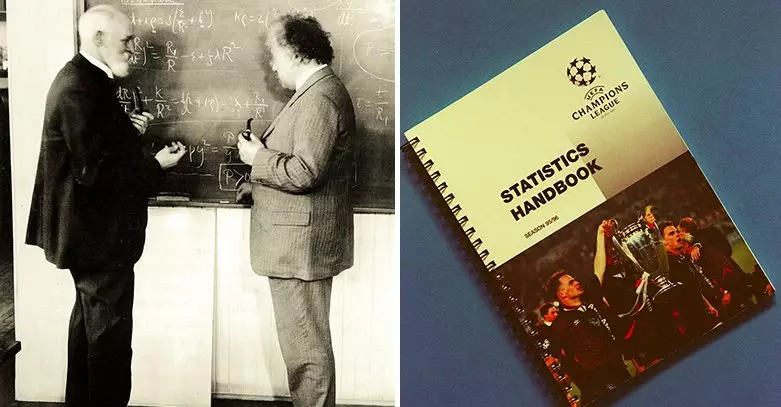
Welcome to the latest installment in our 'For Football Sake' series, looking at some of the daft and silly things in football that really wind us up. We started off last week tackling the whole issue of fans leaving football games early and this week we're back with some strong views on the use of statistics in football.
Let me start by saying I think statistics in football are very useful. When judging a player, putting personal preference aside, the only logical way to rate someone is through numbers and so naturally you would judge a striker on how many goals they score, an attacking midfielder or winger on the amount of assists they registered, a midfielder on the amount of passes they complete, a defender on how many tackles they make and a goalkeeper on the amount of clean sheets they have.
One would turn to statistics when debating that player A is better than player B as it would back up your argument. And as far as coaches and managers are concerned, they are absolutely well within their rights to utilise statistics and data in the modern game. I have written several stat-led pieces and will probably continue to do so at some stage, so I completely accept that statistics have a place in football.
Advert
But at the same time, the overriding feeling I have is that the use of stats in the game is too much and it's getting a bit boring.
I'll use the following scenario. Imagine you're playing your big Sunday League game and feel as though you've had a real stormer, putting yourself about and generally putting in a solid display. But your gaffer opts to give Dave the Man of the Match award because he had 85% pass accuracy and a key pass rate of 2.75759. What's all that about?
I feel there is far too much emphasis on statistics these days. As aforementioned, there is definitely a place for them and they are incredibly useful, but we've gone much further than the standard goals and assists measurements. All these fancy phrases like 'key pass rate' and 'average duels' are over-complicating things and are being used far too frequently. The rise of statistic outlets such as Opta, Squawka and WhoScored have definitely helped in the sense that football fans can consume a lot more information and thus their knowledge improves, but I reckon we are being overexposed. I'm not going to go full 55-year old grumpy Dad mode, but football would surely be a lot more enjoyable if there weren't so many statistics being thrown around.
The following conversation has probably taken place after the game.
Advert
"I thought [insert player] was absolutely brilliant today, he was everywhere." - Fan A.
"Nah, what you on about? He only had an average key pass success of 1.65. Not good enough." Fan B.
There's a case to get the 'Against Modern Football' out here.
Statistics, while they can be used to argue a point, can be incredibly misleading. If a player has scored 30 goals, he's probably pretty good at football, but the more complex stats really irk me.
Advert
You can genuinely make a case for Mark Noble being better than Xavi if you manipulate certain statistics, as you can with Matt Jarvis being better than Cristiano Ronaldo.

Another instance would be that in WhoScored's Team of the Season, Manchester United man Paul Pogba features and has an 8.2 rating. But fans who have watched and monitored his performances this season will know that while he has stepped it up recently, his form this season has not been impressive and nowhere near the level he is capable of reaching. Ashley Young is also in the team and he's only made two starts in the league this season.
Further misleading comes from the fact that a player may complete more passes and have 97% pass accuracy but yet he's a central defender and so has been passing the ball backwards and sideways with no real purpose.
Advert
Sticking with the central defender theme, Sir Alex Ferguson is said to have got rid of solid defender Jaap Stam because he was making less tackles - indicating that Stam was slowing down and in decline. Yet the Dutchman proved that he was very much still a top-tier centre-back after his career at Old Trafford when he turned out for Lazio, AC Milan and Ajax. United inevitably still tasted further success after Stam's departure, but Fergie still cites it was one of his biggest career regrets as for years United struggled to replace him. Perhaps he was making less tackles because his positional sense and reading the game was better? This is an example of how stats don't always tell the story.

If you want another instance, just look at Tim Sherwood's wonderful win ratio at Spurs. Big Tim and his body-warmer only lasted a season and he was also axed in his next job at Aston Villa. The stats would probably tell you that he was one of the most successful managers in Tottenham's history but getting sacked from both of your managerial jobs likely tells you otherwise.
I find the same sort of annoyance in the overuse of tactical diagrams and phrases but we'll save that for another article but I genuinely believe that having so much data is making the good old game of football less enjoyable. These days, I fear that we are focusing too much on the numbers than what is actually going on the pitch.
Advert
Being honest, there aren't too many solutions to the problem unless we go back to the 1930's but I am hoping that the overuse of stats does die down and we no longer have to put up with too much statistic talk. It's getting in the way of my football.
Words by Josh Lawless
Featured Image Credit:Topics: Football